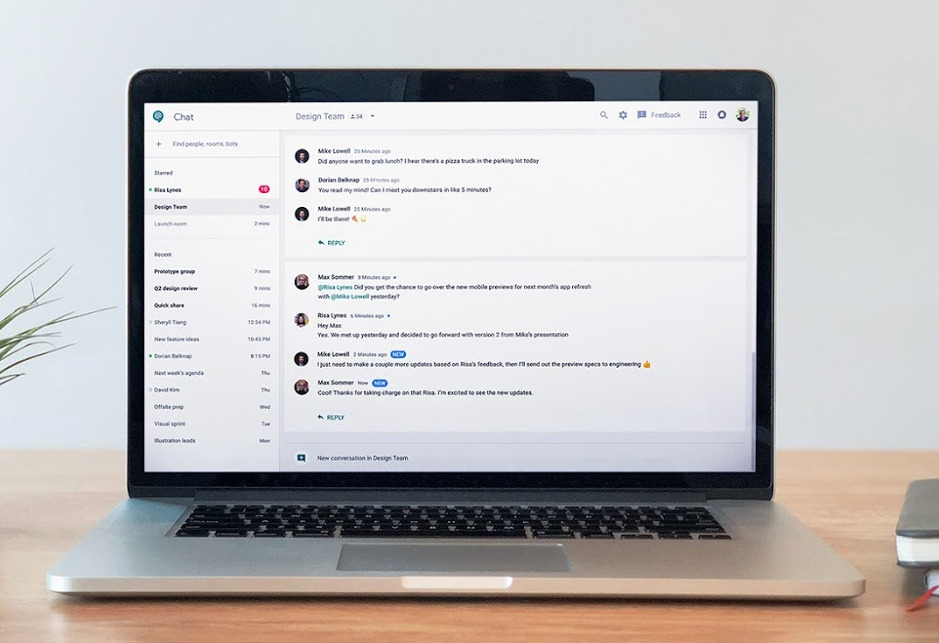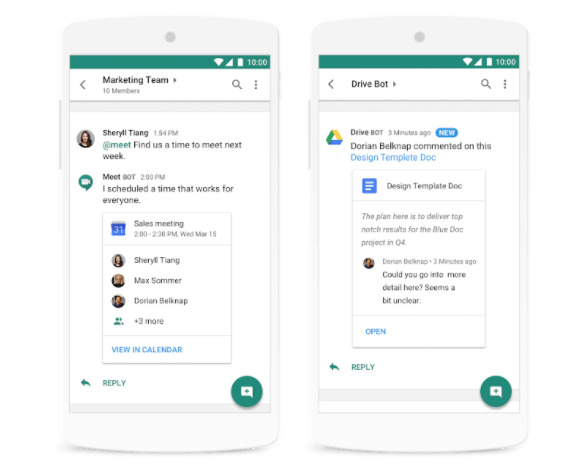Google is increasing its efforts to make its productivity tools indispensable by taking on Slack, announcing its Hangouts Chat app for collaborations between team members will be rolling out to business customers of its G Suite service starting from next week.
Quietly introduced last year in an early adopter program, Google has confirmed it is making Hangouts Chat a core G Suite service starting from today, with the new addition arriving in G Suite accounts in the near future. Users of G Suite accounts will not receive immediate access to the new tool, and will have to wait for the account holder to enable it for them.
While it shares the same name as Google's existing Hangouts messaging service, Hangouts Chat is a separate application that is designed more to help teams work together than for casual conversations. Similar in concept to Slack, Hangouts Chat lets employees in a business talk to each other, or to a specific team, with conversations able to be split off into separate chat rooms dedicated to specific tasks or subjects.
Team members can collaborate through Hangouts Chat with each other while working collectively in the other tools offered in G Suite, including Docs, Sheets, and Slides. Everything in Hangouts Chat is searchable, including team members, conversations, and files shared between employees.
Google also touts the use of artificial intelligence and chat bots to help speed up workflows. A total of 25 different chat bots are included to cover tasks ranging from finance and human resources to CRM and project management, with the bots claimed to simplify tasks, such as booking conference rooms or searching for file, that could take far longer if performed by humans.
Like Slack, Google is allowing its users to build integrations on top of Hangouts Chat, and already has a small library of chat bots developed by third parties for use with the tool. The list includes a number of major enterprise-focused firms, including Freshdesk, Trello, Salesforce, ProsperWorks, Vonage, and Xero.
Google intends for Hangouts Chat to be used by as many users as possible, with each instance capable of supporting up to 8,000 members. Apps for MacOS and iOS, as well as Windows and Android, are being provided by Google, effectively making the tool available on most platforms used by businesses.
Though separate to Hangouts, Google notes Hangouts Chat will still work with its existing communications service, including all of the user's existing contacts.
It remains to be seen if Hangouts Chat will gain traction in an industry dominated by Slack along with attempts to occupy the collaborative chat marketplace by Facebook and others. While Google is seemingly late to the party, the inclusion of Hangouts Chat may cause existing G Suite customers to dump the paid Slack service in favor of a "free" addition to a subscription they already have.
 Malcolm Owen
Malcolm Owen








-m.jpg)







 Charles Martin
Charles Martin



 William Gallagher
William Gallagher
 Christine McKee
Christine McKee
 Marko Zivkovic
Marko Zivkovic









12 Comments
Oh geez...
I thought Hangouts would be dead by now.
• Docs and Sheets are roughly as capable as ClarisWorks was in 1995. Barely any page layout control. Only extremely basic formulas.
Multiple people being able to edit a single document at the same time is useful, but I think Wave was a better implementation of that.
Hangouts is not actually a bad service, but it suffers from too many incomplete/promised features and Googles schizophrenic communications strategy. If they would have just focused their efforts on the features they promised instead of letting it linger while they propped up Voice, Messenger, Jabber, Also/Duo, etc. then they could have consolidated it into a powerful cross-platform service/app with industry gravitas. Instead, they're chasing Apple, Skype & Slack in a downward spiral to irrelevance. Based on their history, how many partners will invest in this knowing Google doesn't usually follow through on their numerous other projects. And, yes, it is an investment for a business to roll this out. Just the end-user training can suck up hundreds of man-hours for a large organization. Add in the lost time while employees fumble with new apps/services until they become proficient enough to be productive, and your talking a lot of money.
“When the product/service is free, you are the product.” This saying particularly applies to Google, as EVERYTHING they do supports their ad business.
So why wouldn’t I want Google collecting data about my business communications? Oh wait ...